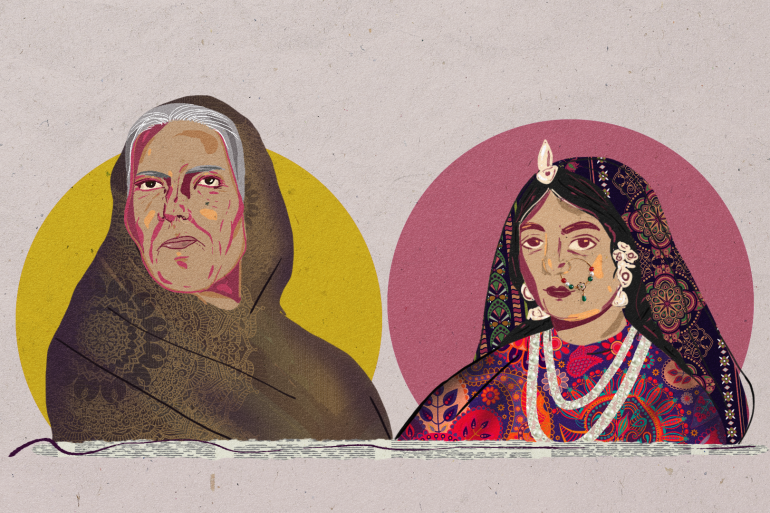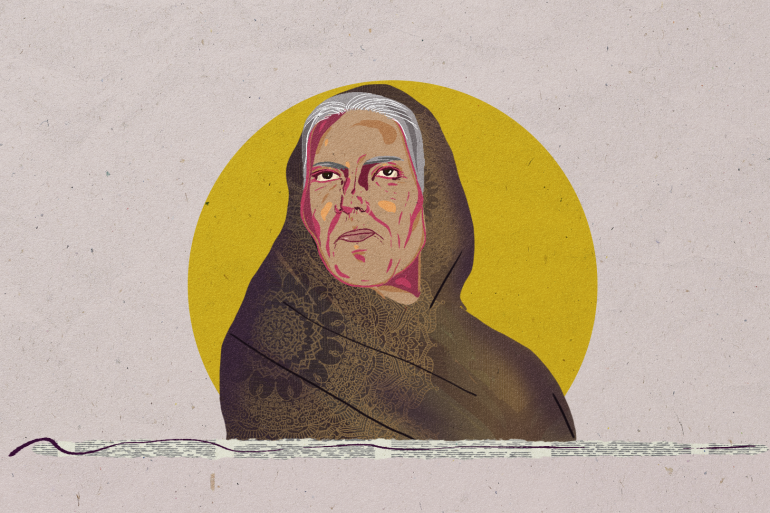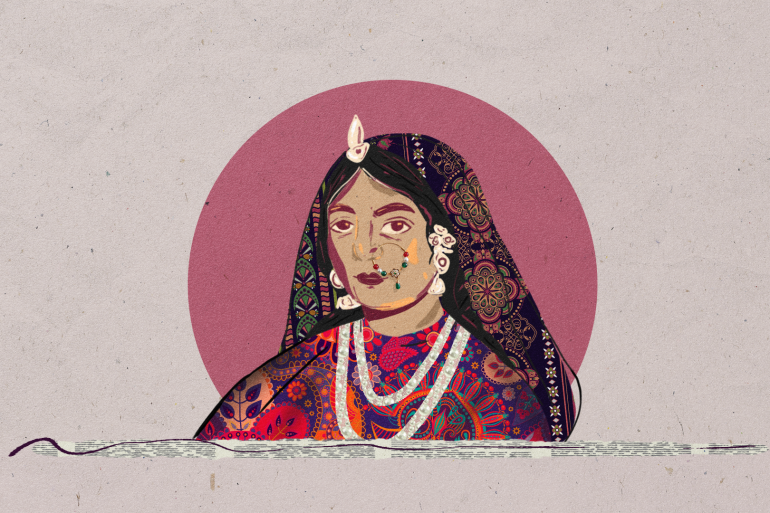Bilkis Dadi of Shaheen Bagh, a modern-day Jhansi Ki Rani
India’s 83-year-old protesting grandmother and the warrior queen who inspires her.

When asked which woman she most admires, Bilkis, the notorious “Dadi” of Shaheen Bagh, replies without hesitation: “Jhansi Ki Rani” (Queen of Jhansi).
India’s warrior queen, who died in 1858 fighting British imperialism, is a symbol of India’s independence and an emblem of resistance to the British empire.
Keep reading
list of 4 itemsIn Pictures: Nigerian women use fashion to ease the trauma of war
‘As if she had never existed’: The graveyards for murdered women
Thousands of Indian women join farmers’ protests against new laws
“She chased the British out of India,” Bilkis explains. “If we all come together, we can raise our voice and do anything.”
They may have been fighting different perpetrators, but to Bilkis their struggle against oppression and injustice is the same. “I am brave. Just like how Rani stood up for her rights and fought against injustice.”
At first glance, the comparison between a sword-wielding warrior queen who enjoyed weightlifting, wrestling, and steeple-chasing in her free time, and a bespectacled 83-year-old grandmother with silver locks and a pale pink dupatta, who enjoys eating toast and studying her Quran, might seem rather peculiar. But, just like Rani of Jhansi, Bilkis “Dadi” (Dadi meaning grandmother in Urdu) has earned a reputation for fighting against discrimination and inequality.
Sitting beside her son, 46-year-old Arabic to Hindi translator, Manzoor Ahmad, and her 10-year-old granddaughter, Rimsha, she recounts the story of her life and how she became known to the world as Bilkis Dadi of Shaheen Bagh.
Bilkis was a New Year’s baby, born on January 1, 1938, in Kurana, a sizable village in India’s most populous state, Uttar Pradesh. It is a majority Muslim village with seven mosques. She grew up in a family of farmers with three sisters, enjoying a “normal and good childhood”.
Like her idol, Rani of Jhansi, she was married at 14. However, Bilkis only moved to live with her in-laws when she was 18. At 20, she gave birth to the first of her five sons.
Ten years ago, her husband passed away from stomach cancer and Bilkis moved to live with her sons in Shaheen Bagh, the working-class, majority Muslim enclave of south Delhi.
The pride her son and granddaughter feel for her is obvious even through the pixilated screen of our WhatsApp video call. “She always spoke her mind and nothing scared her,” says Manzoor.
Bilkis says she never experienced discrimination when she was young, but recent events transpiring in India have troubled her, especially one that took place near her home in Shaheen Bagh.

On December 11, 2019, the Citizenship Amendment Act (CAA) was passed in India’s parliament. This amended the Citizenship Act of 1955 by granting a swifter pathway to citizenship for religious minorities in three predominantly Muslim nations: Bangladesh, Pakistan, and Afghanistan. Notably, these provisions exclude Muslims.
Amit Shah, the federal home minister of India’s governing Bharatiya Janata Party (BJP), said: “Muslim citizens of this country have no reason to worry,” as the act is “intended to give citizenship, not take away citizenship.”
But this did little to reassure many of India’s 195 million Muslims. Bilkis was one of many who felt fear over the news. “In the citizenship act, undocumented Muslims cannot become citizens, and I feel it’s not right. Many of them came and had no documents. Where can they get the documents now? What of the children whose parents are dead or abandoned them, where will they get their documents? They have been in India their whole life. It’s not fair,” she says, shaking her head in dismay.
As a woman with a deep sense of justice embedded in her from childhood through familial and religious values, this did not sit well with her.
The act has not only been criticised for excluding persecuted Muslim refugees and migrants in the region, like the Rohingya of Myanmar, it has also been accused of discriminating against religious minorities facing persecution in non-Muslim countries, such as the Tamils in Sri Lanka or Tibetans in China.
Protests against the act broke out across India, including in Bilkis Dadi’s usually quiet neighbourhood.
On December 13, 2019, the students of Jamia Millia Islamia University near Shaheen Bagh marched to Parliament to demonstrate against the CAA. What began as a peaceful protest ended violently as Delhi police used batons and tear gas against the students, wounding approximately 100 people.
“I saw police going into the university and catching students,” Bilkis recalls. “They [the police] even went into toilets to arrest students. I saw a lot of injustice and realised I needed to support the protests.”
When she overheard her neighbours making plans to attend protests in their neighbourhood, Bilkis knew she had to join them. It started with 10 to 15 local women blocking Kalindi Kunj Road (Road 13A), a six-lane highway adjoining Shaheen Bagh.
When Bilkis joined, she was the oldest one there. No one in her family knew she was going off to protest. “I didn’t tell anyone,” she says, “I just went.”
I want religious harmony. I want everyone to be together again, like how it was before. We are Indians and we have been in India for a long time and never thought to leave to anywhere else because we want to stay here, where there are so many religions, cultures, people, and food.
Bilkis says she knew that despite being uneducated – apart from in the Quran, which she reads daily – she could make a difference and send a message to the Indian government. But for all her outspokenness, she had never before participated in a protest. Still, with India’s religious harmony fraying and threatening to unravel, she felt it was her duty.
“I want religious harmony. I want everyone to be together again, like how it was before. We are Indians and we have been in India for a long time and never thought to leave to anywhere else because we want to stay here, where there are so many religions, cultures, people, and food,” she reflects.
“It’s like flowers,” Manzoor interjects. “Together, different flowers make a nice bouquet.”
This is the harmonious, multicultural future she wishes for her granddaughter, who sits pressed up against her. “I want to be a doctor,” Rimsha says with a playful smile. Bilkis nods in approval with a twinkle in her Kajal-lined brown eyes.
At first, Bilkis would join sit-in protests from morning until evening, returning home for supper. But, as the protests went on, she started to spend some nights there as well. “I would spend the night at the protests on alternate days,” she explains. “Sometimes I would get a fever so I’d come back home to take fever medication and then go right back.
“Every day I would walk 1.5 kilometres [0.9 miles] to the protest site,” she says proudly.
She refused to let age or illness stand in her way as other elderly women followed her lead. She and her band of elderly female protesters became affectionately known as the “Shaheen Bagh Dadis”.
They (the police) told me to just ‘enjoy my life and relax now’.
Bilkis would go on to peacefully protest for 101 days. Had it not been for coronavirus restrictions, she believes she would have continued for even longer.
Despite her tenacity, Manzoor says his mother occasionally feared for her life when protesters were fired at.
He says the entire family is proud of his mother’s tireless efforts to combat injustice. “I feel very proud to have a mother like her.”
On the walls of their home are the awards and certificates she was given following the protests. “I am happy and proud I took part in the citizenship protests and supported the farmers’ protests and I’m happy I’m in magazines like TIME magazine’s 100 most influential people list. However, my real happiness will only come when the unjust laws are repealed or amended to be fair,” she explains.
Her activism did not stop at the CAA protests. When farmers in Punjab and Haryana started protesting against three farm laws they say will endanger their livelihoods by opening up the agriculture sector to private firms, she knew she needed to show solidarity.
“Punjabis came to Shaheen Bagh to support us, and since most of the farmers are Punjabis, I wanted to support the farmers. As the daughter and daughter-in-law of farmers, I stand with farmers. We are a farmer family,” she says.
In December 2020, Bilkis attempted to attend a farmers’ protest in New Delhi, but the police stopped her and took her back home, saying it was for her “own safety” considering her age and the coronavirus pandemic.
“They [the police] told me to just ‘enjoy my life and relax now’,” she says, adding that they made it clear she was not welcome at that protest or any other.
“They know that if she is at the protest, the global media will cover it and they [the authorities] don’t want to draw attention to what is happening to our farmers,” says Manzoor.
For now, Bilkis says she prays for the farmers and for a return to the India she once knew and cherished.
Untraditional Indian icons

The Rani of Jhansi, also known as Queen Lakshmibai, was born as Manikarnika Tambe in the ancient city of Varanasi on the banks of the river Ganges on November 19, 1828. She was born into a Hindu-Brahmin household, the priestly and most privileged caste among North Indian Hindus. However, unlike many other royals who came before and after her, she was not born into a royal family.
The queen ruled the north of India, which included one of the princely states, Jhansi. When her husband, the Maharaja, passed away, her adopted son was to be the next heir to the throne. But the British rejected his claim and expanded their control over India, depriving the queen of her sovereignty and annexing her territory. When discussions with the British failed, she joined the Indian rebellion of 1857 where soldiers, townspeople, landowners, and others opposed to British rule fought in India’s first independence operation, long before Mohandas K Gandhi helped spearhead the nation’s most prominent independence movement.
Queen Lakshmibai trained her army, which included men and women, but died on the battlefield when she was 29 years old in 1858. Her legacy is cemented in India today, with countless references in pop culture, films, and novels. She has remained one of India’s most iconic leaders.
Like the Rani, Bilkis is redefining what it means to be a woman – and a widow – in India’s often patriarchal society. Widows have occupied a marginalised and stigmatised place in traditional Indian society, and although customs like Sati, where widows throw themselves onto their husband’s funeral pyre and burn to death, have been outlawed, many widows are still ostracised by their families and villages.
Queen Lakshmibai did not follow societal norms on how wives should behave. Instead of hiding behind a veil or lurking in the shadows of her palace, never to be seen or heard from, she would engage in dialogue with British officials. When her husband died, her life did not end. She joined a revolution inspiring freedom fighters for generations to come. Similarly, as an 83-year-old widow, Bilkis has been recognised as one of the world’s most influential figures. Just as the Rani of Jhansi mobilised a battalion of men and women into battle, so did Bilkis in her own way. She assembled her band of elderly women to fight for their rights and the rights of their neighbours and friends, and the future of their grandchildren. In the recent farmers’ protests, widows – many of them the wives of farmers who died of suicide after accruing unmanageable debts – have participated.
The British saw the Rani of Jhansi as a “wicked, jezebel-like” character. But, she was revered by Indians as a symbol of national pride and gallantry. Bilkis too has her share of critics, those who lambast her off and online. For many though, she is an inspiration – a grandmother who enjoys waking at dawn, eating her daughter-in-law’s biryani and spending time in her humble carnation-tinted home with its cosy vegetable garden when she is not out protesting against injustice.
“My message to Indian women, especially Muslim women, is to use your voice and speak up. Educate yourself, don’t just get married, and take no kind of injustice, inside and outside the home. But after you study, never forget where you came from. Remember to always respect your elders and your family,” she says, sitting cross-legged in her pink kurta pyjamas.
“My dream for India is to one day go back to how it was before: everyone together in peace – cooking together and eating together,” she reflects.
One of the Rani of Jhansi’s most iconic quotes goes: “Meri Jhansi nahin dungee” (“I will not give up my Jhansi”). It is a patriotic battle cry for the India she yearned for – an independent India, free of colonial rule. Bilkis too will not give up her India. That is an India of plurality, harmony, cohesiveness. The India that she and her late husband knew well.